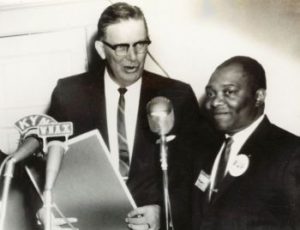
*Ted Blakey was born on this date in 1925. He was a Black businessman.
From Yankton, SD, his family migrated from Missouri to find a better life amid the horrors of the Jim Crow South. Blakey’s father was accused of assaulting a white woman after bumping into her in a dry goods store. The clerk threatened to lynch him if he ever returned. When he got home, he told his wife they were leaving for South Dakota. They arrived in Yankton on Oct. 16, 1905.
In the Dakotas, Blacks did not find the same attitudes toward them that were prevalent in Southern states, but the discriminatory language still found its way into early territorial laws. In his first message to the new territorial legislature in 1862, Gov. William Jayne called for a ban on slavery. Despite his entreaty, a committee passed a bill preventing “persons of color” from residing in the Dakota Territory. Fortunately, the full House rejected the measure. Still, the Organic Act that authorized a government for Dakota Territory declared that only “every free white male inhabitant of the United States…shall be entitled to vote at the first election.” Not until 1868 did the legislature delete the word “white.” Similarly, schools were “equally free and accessible to all white children” until 1868.
Blakey became the owner of a successful janitorial service and pest control business in Yankton. In 1960, Blakey was Alpha Lodge #10 P.H.A. and Eastern Star South Dakota Outstanding Negro Citizen. He was also president of the school board and the PTA and active in the Jaycees and Kiwanis. “It was never really that bad,” Blakey recalled in a 2001 interview, though there were incidents of discrimination in the 1960s.
South Dakota’s chapter of the National Association for the Advancement of Colored People (NAACP) surveyed the state and found certain restaurants in Sioux Falls, Rapid City, Huron, Mitchell, and other larger towns refused to allow Blacks to eat in. Another survey by the Black Hills Civil Rights Committee revealed that 90 percent of bars and barbershops and 30 percent of restaurants and motels in Rapid City refused service to Blacks.
The NAACP and Gov. Archie Gubbrud recruited Blakey to remedy the situation. “That was when I really hit it,” he later recalled. “I went before Rotary, Kiwanis, the Sacred Heart PTA, and a lot of clubs there. Until then, a black person couldn’t get a haircut in Yankton until after 5 o’clock. He (the barber) pulled down the shade and cut your hair. There was not a barbershop in Yankton that would cut a black man’s hair in 1963.” In 1963 Blakey helped Gov. Gubbrud sign a Civil Rights Bill. Blakey also urged the state legislature to approve the 24th amendment to the constitution, eliminating the poll tax. South Dakota was the 38th and final state needed to approve the amendment in 1964. In 1969, SD Gov. Frank Farrar appointed him to serve on the newly established SD Human Relations Commission, and he was re-appointed in July 1972.
He has also served as president of the Yankton County Old Settlers Picnic. In 1970, he was appointed to the Advisory Committee of the State Department of Welfare. Blakey served six years on the SD Easter Seals Board. In 1970, Gov. Farrar inducted him into the Order of the White Buffalo. He was actively involved in the Yankton Antique Auto Association. In time, Blakey became the unofficial spokesperson for South Dakota’s Black community, a role he especially relished whenever outsiders had questions.
In 1970, he helped organize a pony express ride in southeast SD, starting at WNAX Radio in Yankton and ending at the Western Mall in Sioux Falls. In 1971, he assisted Yankton banker Wilbur Foss, in starting the South Dakota Old Time Fiddling Contest, with over 900 in attendance at the Pine Acres 4-H Building in Yankton the 1st year. He was chairman of the fiddling contest for three years and in 1976, he received the Jarle and Inga Foss Sportsmanship Award.
Another program that Blakey became involved with was the Miss Black South Dakota Pageant. The first pageant was held on the Yankton College campus in April 1977. In 1984, SD Gov. William Janklow appointed Ted to the Governor's Office of Economic Development. He served under Gov. George Mickelson and Gov. Janklow. In 1994, Ted Blakey was asked and accepted to give the secondary speech for Carol Hillard, seeking the nomination for lieutenant governor of South Dakota, the 1st woman to be elected to that position in South Dakota history. In Feb. 1997, Ted was honored as Citizen of the Year. Ted Blakey died on October 11, 2004.
